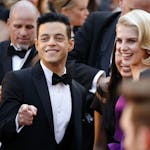Loon in Late November Water
By Freya Manfred. (Red Dragonfly Press, 100 pages, $16.)
In her ninth collection "Loon in Late November Water," Freya Manfred confronts aging while celebrating poetry as an accessible and practical tool for living. A woman searches for "a poem so sad that my body could collapse into it … a poem which would also hand me one flower." Poems "come like gentle friends every night."
Poems are spaces in which to work through struggle and strife in order to access the "joy and wonder" of the Minnesota landscape where Manfred makes her home. There she finds "water,/singing a fierce wordless song of being here, alive." The landscape is abundant with wisdom and inspiration; the loon in particular is a patient teacher. "I try to live like the loon, on the surface and below." This move between surface and depth is evident in poems that consist of careful observation that open into profound sentiment: "You've swallowed enough guilt — and lasting sorrow."
She longs for "plain words," and her work answers this longing with lucid descriptions and clear lessons such as "remember not to put duty and worry/before peace and light and love."
tsunami vs. the fukushima 50
By Lee Ann Roripaugh. (Milkweed Editions, 120 pages, $16.)
In "tsunami vs. the fukushima 50," Lee Ann Roripaugh personifies the 2011 Japanese tsunami as an avenging "annihilatrix." She — and Roripaugh's tsunami is decidedly a she — tears free of the "barbed wire that interns her," unleashing her fury in a torrent of ornate and wildly inventive language: "An escargatoire of sunflowers" and "a scourge of becquerels." Roripaugh's tsunami is a complex figure, destructive but not necessarily evil. A "cryptic giver of gifts," she possesses a "terrible radiance."
The collection's title recalls classic Japanese monster movies such as "Mothra vs. Godzilla" and honors the workers who risked their lives to stabilize the Fukushima nuclear power plant after the tsunami.
Monsters arise from the human-made disaster of the meltdown, something "as it turns out, preventable." In the aftermath, mutant animals survive with "cesium 137/disco-glittering their veins." Grief, trauma and desperation transform people into sci-figures such as the man searching for his lost daughter in the contaminated wreckage. His persistence earns him the nickname "The Hulk." Upon seeing a sign that reads "Nuclear Power: Bright Future/of Energy," he remarks, "I feel such a huge/surge of adrenaline and rage,/that I have to tear it down."
Mitochondrial Night
By Ed Bok Lee. (Coffee House Press, 88 pages, $16.95.)
The title of Ed Bok Lee's second collection, "Mitochondrial Night," refers to the genetic material we inherent matrilineally. Similarly, transnational trauma is passed down through the stories of women: "Odds/are someone has raped/multiple bodies still cowering/in your DNA."
Seemingly paradoxically, Lee's poems about massacres, hate crimes and PTSD radiate with "a deeper belief in the brightness of human souls … now livid in its demand for a new kind of poetry." The "new kind of poetry" Lee forges is wide-ranging and hefty, with long poems knitting together exhaustive description with philosophical assertions while chronicling the past, examining the present and imagining the future. He writes, "When our Babygirl was born, a space/inaccessible inside me suddenly began to breathe." In this space of healing, Lee decides to "renovate my heart." He builds "a sanctuary" that is "part wood, grass, plastic/castle, spaceship, cocoon, and cathedral."
Here, the fragments of a shattered past serve as a resource for the creation of new forms of living in which hope and healing don't require forgetting. He writes, "Superstition created millennia ago can always construct a more hospitable home."
Events: In conversation with Nicole Chung, 12:45 p.m. May 11, Wordplay Festival, downtown Minneapolis; 6 p.m. May 20, East Lake Library, 2727 E. Lake St., Mpls.; 7 p.m. May 21, University Club, 420 Summit Av., St. Paul; 7 p.m. June 6, Moon Palace Books, 3032 Minnehaha Av. S., Mpls.
Deaf Republic
By Ilya Kaminsky. (Graywolf Press, 76 pages, $16.)
"Deaf Republic" tells the story of an occupied town where residents lose their hearing after a deaf child is shot — a collective and astonishing response given that millions of state killings regularly occur with little notice. In this concise series of poems, Ilya Kaminsky considers the positions of witnessing, passive watching and intervention. The book is punctuated by diagrams of sign language words and phrases. "The town watched" is repeated to mark moments in which violence unfolds as a spectacle without resistance.
Kaminsky writes, "Deafness is our only barricade." Silence is not only a form of embodied resistance; it also creates a space for love to flourish free of state control: "I have/no country but a bathtub and an infant and a marriage bed!"
Kaminsky bookends this collection, chillingly, with poems that directly confront the reader with our inaction in the face of atrocity, implicating himself as well: "When they bombed other people's houses, we/protested/but not enough." The book ends with an image of people hunched over phones, watching a video of police killing someone. The speaker instead turns to "watch birds splash over backyards." He asks for forgiveness, but if looking away is forgivable remains ambiguous in this prescient and incisive volume.
Elizabeth Hoover is a poet in Milwaukee.






